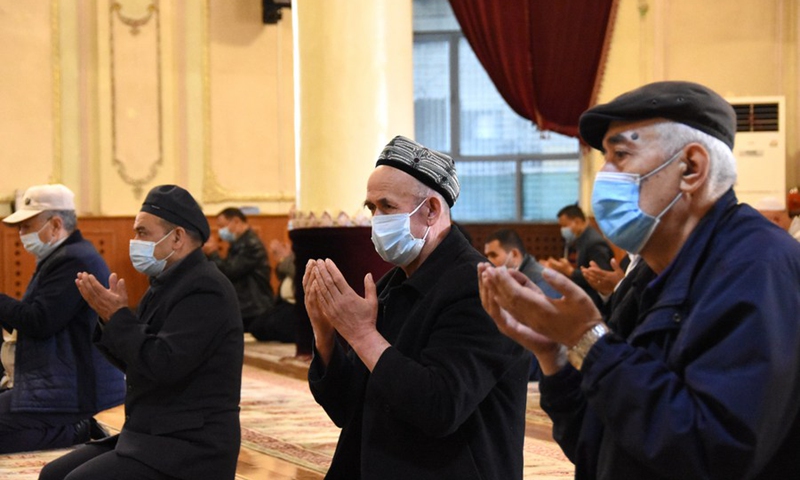
Worshippers pray in the Ak Mosque in Urumqi, Northwest China's Xinjiang Uygur Autonomous Region on April 13, 2021. (Photo: Xinhua)
The government of Northwest China's Xinjiang Uygur Autonomous Region refuted rumors fabricated by foreign media claiming China is forcibly tearing down mosques in this region, explaining it is just reconstructing or removing dilapidated mosques that pose a danger to Muslims.
"There's no so-called forced demolition of mosques problem in Xinjiang," said Elijan Anayat, a spokesperson for the Information Office of the Xinjiang government at a press conference on Sunday.
The spokesperson said that most mosques in Xinjiang were built between the 1980s and 1990s, and some of them are adobe houses, some are very small, and some are decrepit. Religious activities cannot be carried out in buildings in such condition, and they pose a great danger to Muslims if an earthquake strikes, said Elijan Anayat.
Furthermore, the location of some mosques makes it inconvenient for Muslims to conduct religious activities, said the spokesperson. He noted that with the speeding up of urbanization and implementation of rural vitalization, some local governments, at the request of Muslims, have begun to tackle the problems of the dilapidated mosques with measures including the reconstruction, relocation or expansion of those buildings.
He said such measures are being welcomed by religious people, and mosques in Xinjiang can now meet Muslims' needs.
His remarks came after
some Western media, including the New York Times and Voice of America, used satellite images to prove their claims that Xinjiang is tearing down mosques.
Some other foreign media also claimed that some religious people, who are not recognized by the government, were detained by the Xinjiang government.
Elijan Anayat said that those so-called "detained religious people" are actually terrorists who were spreading religious extremism, and seeking to incite separation and terrorist activities. Some decent religious people have been expelled, or even killed by those terrorists.
For example, under the influence of religious extremism, Xinjiang has suffered thousands of terrorist acts, in which a large number of innocent people, including well-respected religious clerical figures, were killed. Those extreme acts have caused great damage to people from all ethnic groups, including Muslims, and disparaged the image of Islam, according to the spokesperson.
He said that China is a country ruled by law, and the government cracks down on all sorts of criminal activities according to law, including those done in the name of religion, and China has never specifically targeted any religion during this process.
Now that Xinjiang hasn't seen terrorist acts for four consecutive years, people from all ethnic groups all back the government's measures, said the spokesperson.




